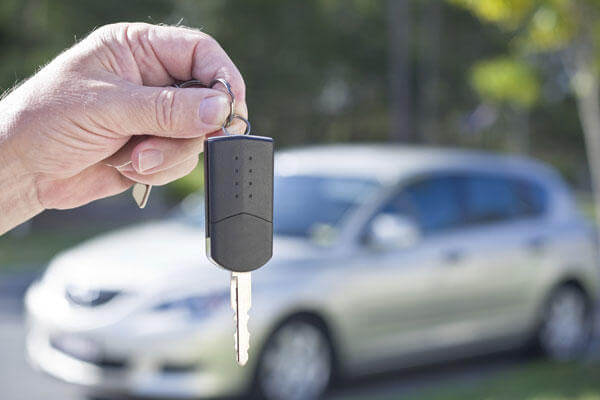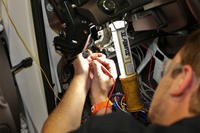If only buying a car were as simple as buying a pack of gum -- pick a flavor, plunk down a dollar and go on your way. The purchase of a new vehicle involves a tangled web of financial decisions that can make even an experienced car buyer's head spin.
"Even after you've chosen the vehicle itself, the way you handle the purchase can have a significant impact on your long-term financial security," says J.J. Montanaro, a certified financial planner™ practitioner with USAA.
But vehicle financing doesn't have to be a guessing game. Here's a breakdown of five key decisions you're likely to face and some professional advice to help you choose wisely and get the most for your money.
1. Trade in your old car or sell it on your own?
Be aware of how selling your current car plays into the financial equation of buying a new one. Fetching as much cash as possible can help you make a bigger down payment, which may allow you to pay off your new vehicle sooner and reduce interest charges.
While trading in your vehicle to the dealership where you buy your next car might be the easiest way to sell, most professionals agree it's usually not the best idea. The dealership's goal is to resell your old car at a profit, so it's likely to pay you less than you'd get if you took the time to sell it to an individual. Trading in your vehicle also can complicate negotiations, as your trade-in becomes yet another bargaining chip.
Selling your vehicle yourself is now easier than ever, thanks to listing sites such as Cars.com and Autotrader.com.
2. How much cash upfront?
Some buyers with substantial savings insist on paying for their vehicles in cash. That way, they don't have to make car payments or pay interest. But not everyone agrees that forking over $30,000 all at once is a great idea.
"Paying cash for a car can be a mistake," says Lauren Fix, known as the Car Coach®, a nationally recognized automotive expert and analyst. "You could make better use of that cash by investing it in something that makes money."
If your investments can earn more than you'd pay in interest over the life of an auto loan, then it makes sense to finance the car for several years instead of tying up all that money in a depreciating vehicle.
For most buyers, however, buying in cash isn't even an option — they need a loan to afford a decent car. However, it may be unwise to finance the entire purchase, making no down payment whatsoever.
Taxes and fees add to the vehicle sticker price, which means that with no money down, you'll owe more than the car is worth as soon as you drive off the lot. The situation could get worse as the value of your new car depreciates. This is known as being "upside-down" on your loan. If you need to sell the car or if it's totaled in an accident, you'll get less money than you need to pay off the loan and may have to pay thousands of dollars out of pocket.
Montanaro recommends making a down payment of 15% to 20% of the purchase price — an amount that should lower your monthly payments and hopefully keep you "right-side up."
3. Where to get a loan?
The dealership is one place to secure vehicle financing. Unfortunately, many car buyers still believe that's their only option. Fix recommends shopping around.
"You might find lower interest rates at your credit union or other lending organizations where you're a member," she says. "They will be more likely to work with you on the terms."
Fix also recommends getting preapproved for an auto loan before you're ready to buy. Walking into the dealership with a loan lined up allows you to think like a cash buyer, focusing only on negotiating the price of the car and not falling prey to slippery sales tactics that entice you to spend more. If the dealership offers you a better financing deal than your preapproved loan, all the better.
4. How long should the loan be?
The longer the loan period, the smaller the monthly payments. That fact is what tempts many car buyers to finance their cars over five, six or even seven years. Not wise, says Montanaro.
"Opt for a vehicle that you can comfortably pay off in three to five years," he says. "If you have to go longer than that to afford the payments, you should choose a less expensive car."
Ultra-long loans are risky to your financial health for two reasons. First, stretching out your payments over many years means you'll pay more in interest. And, typically, a longer loan term comes with a higher interest rate. So extending your loan by even one year could add to the total cost of your vehicle.
Second, since new vehicles typically depreciate quickly, a longer loan increases your likelihood of being upside-down.
"Never finance a car for longer than you plan to own it," Fix adds. Dealers might offer you the option to roll your outstanding loan amount into the cost of buying another new car, but that simply prolongs your debt, she says.
5. What's the best incentive?
In an attempt to drive sales, many dealers will offer either low-rate financing or a hefty cash rebate on a new vehicle, but not both. What to do?
"There are a lot of variables in play," says Fix. "You have to analyze the numbers on both offers, and read the fine print to find out which will lower your payments more."
And if you have the option to take the dealer's rebate and find a low-rate loan from a third-party lender, it might be possible to have your cake and eat it, too.










